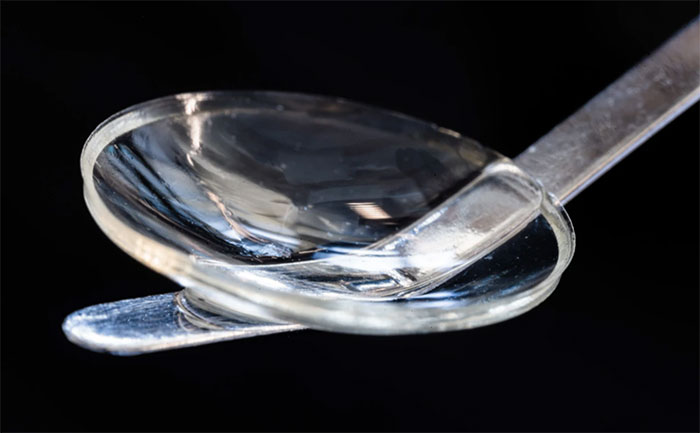Corneal extracted from pig skin can restore vision for blind people
These corneas, described in the journal Nature Biotechnology, could help restore vision to people in countries with a shortage of low-priced corneal transplants. Unlike the human cornea, which must be transplanted in two weeks, bioengineered organs can be stored for up to two years.
Corneal implants are made from collagen protein extracted from pig skin, which has a similar structure to human skin. The purified collagen molecules have been processed to ensure that no animal tissue or biological components are left over. The team from Linköping University in Sweden then stabilized the loose molecules into a hydrogel scaffold that resembles a human cornea, strong enough to be implanted in the eye.

The cornea is made of collagen protein extracted from pig skin, similar in structure to human skin.
Surgeons in Iran and India conducted a pilot trial on 20 people who were blind or near loss of vision due to keratoconus. This disease thins the cornea, the transparent outermost layer of the eye, making it impossible for the eye to focus properly. The implant restored the thickness and curvature of the cornea. All 14 participants who were blind before surgery had their vision restored, with 3 of them achieving perfect 20/20 vision.
Although corneal transplants in patients with keratoconus often use sutures, the team tested a new, simpler and safer surgical approach. They use a laser to make an incision in the middle of the cornea before inserting the implant, which helps the wound heal faster and causes less inflammation afterward. As a result, patients only need to use immunosuppressive eye drops for eight weeks, while traditional transplant recipients typically have to take immunosuppressive drugs for at least a year.
Surprisingly, the implant changed the shape of the cornea enough that the recipient could wear contact lenses for the best vision possible, even though they couldn't tolerate wearing contact lenses before. round.
The cornea helps focus light rays onto the retina at the back of the eye and protects the eye from dirt and germs. When damaged by infection or injury, it can block light from reaching the retina, making it difficult to see.
Corneal blindness is a big problem: an estimated 12.7 million people are affected by the condition, and cases are increasing at a rate of about one million per year. Iran, India, China and countries in Africa have particularly high rates of corneal blindness, especially keratoconus.
Because pig skin is a by-product of the food industry, the use of this bioengineered implant device would have potential benefits, said Neil Lagalo, professor in the Department of Biomedical and Clinical Sciences at Linköping University. Lower cost than donor corneal transplant.
"It will be affordable, even for people in low-income countries," he said. It is much more cost-effective than traditional corneal transplants that are being performed at the present time."
The team hopes to conduct a larger clinical trial with at least 100 patients in Europe and the US. In the meantime, they plan to begin the regulatory process required for the U.S. Food and Drug Administration to eventually approve this device for market.
- The film is thinner than the hair, which helps blind people regain their sight
- The man is blind because of 'dental implants'
- Camera helps blind people recover their vision
- 'Patch' helps restore eyesight
- Technology to support vision
- Breakthrough helps restore vision for the blind
- New breakthroughs help blind people see their eyes
- Restore vision with new implant techniques
- Electronic eyes: add bright hope for blind people
- Inventing a gel that heals corneal lesions without surgery
- Technology boom for visually impaired people
- The visually impaired first regained vision with skin cell transplants
 Green tea cleans teeth better than mouthwash?
Green tea cleans teeth better than mouthwash? Death kiss: This is why you should not let anyone kiss your baby's lips
Death kiss: This is why you should not let anyone kiss your baby's lips What is salmonellosis?
What is salmonellosis? Caution should be exercised when using aloe vera through eating and drinking
Caution should be exercised when using aloe vera through eating and drinking